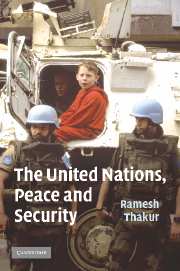Book contents
- Frontmatter
- Contents
- List of figures
- List of tables
- Foreword, Gareth Evans
- Acknowledgements
- Introduction
- PART I An international organisation for keeping the peace
- PART II Soft security perspectives
- PART III Hard security issues
- 7 The nuclear threat
- 8 International terrorism
- 9 Kosovo 1999
- 10 Iraq's challenge to world order
- 11 The responsibility to protect
- 12 Developing countries and the eroding non-intervention norm
- PART IV Institutional developments
- Conclusion: at the crossroads of ideals and reality
- Index
10 - Iraq's challenge to world order
Published online by Cambridge University Press: 24 May 2010
- Frontmatter
- Contents
- List of figures
- List of tables
- Foreword, Gareth Evans
- Acknowledgements
- Introduction
- PART I An international organisation for keeping the peace
- PART II Soft security perspectives
- PART III Hard security issues
- 7 The nuclear threat
- 8 International terrorism
- 9 Kosovo 1999
- 10 Iraq's challenge to world order
- 11 The responsibility to protect
- 12 Developing countries and the eroding non-intervention norm
- PART IV Institutional developments
- Conclusion: at the crossroads of ideals and reality
- Index
Summary
‘We're an empire now, and when we act we create our own reality.’
‘… truth can be created by assertion, principle can be established by deception and democracy can be imposed through aggression’.
Wars are cataclysmic events. Out of the destruction of major wars emerge new fault lines of international politics. This is why the Iraq war has the potential to reshape the bases of world order in fundamental, profound and long-lasting ways. The war proper proved to be swift and decisive. The most pressing task in ‘post-war’ Iraq became to stabilise the security situation, establish a transitional political authority, initiate the necessary steps for post-war reconstruction, peacebuilding and reconciliation, and embed these in durable institutions and structures sufficiently resilient to survive the withdrawal of a foreign presence in due course. The larger goal in the region was to assuage the humiliation inflicted on the collective Arab identity, deal with legitimate Palestinian grievances with the same mix of boldness and firmness shown in Iraq, and impress upon the Arab world in general the need for deep political, social and economic reforms.
In this chapter I propose to examine the impact of Iraq through three ‘cuts’: the impassioned debate before the war; the relationship between the goals pursued and the means employed; and the need for the international organisation and the hyperpower to come together in the common cause of peacebuilding after the war. I conclude by reviewing the argument that the world is better off with the ouster of Saddam Hussein.
- Type
- Chapter
- Information
- The United Nations, Peace and SecurityFrom Collective Security to the Responsibility to Protect, pp. 222 - 243Publisher: Cambridge University PressPrint publication year: 2006



